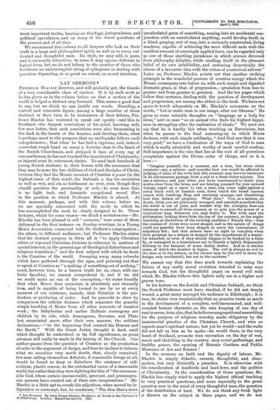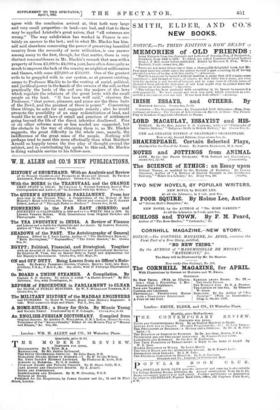LAY SERMONS.*
PROFESSOR BLAME deserves, and will probably get, the thanks of a very considerable class of readers. It is by such work as he has given us in the volume before us that a section of the world is helped a distinct step forward. This seems a good deal to say, but we think we can justify our words. Standing, a central and venerable figure, among a large number of those destined in their turn to be instructors of their fellows, Pro- fessor Blackie has ventured to speak out openly—and this in Scotland—the deepest convictions of his mind, knowing well, few men better, that such convictions were also fermenting in the dark in the hearts of the hearers, and shewing them, what is perhaps most to the purpose, that no earthquake follows such outspokenness ; that when he has laid a vigorous, and, indeed, somewhat rough hand on many a doctrine dear to the heart of the Scotch Churchman, and stripped it bare of every rag of reasonableness, he has not touched the inner heart of Christianity, or injured even its outermost shrine. To send back hundreds of young Scotch students to their homes with the assurance that they may be none the less children of God and disciples of Christ, because they find the Mosaic account of Creation a poem (in the highest sense of that word), the Sabbath a day for recreation as well as rest, and sin as loathsome as ever, even though they should question the personality of evil,—to even dare this, is no light task, and demands exceptional moral fibre in the position in which Professor Blackie is placed. At this moment, perhaps, and with this volume before us, we are specially concerned with the mode in which he has accomplished the work he clearly designed to do. These lectures, which for some reason—we think a mistaken one—Mr. Blackie has been pleased to call "sermons," were some of them delivered in the first instance on Sunday evenings, to a Young Men's Association connected with Dr. Guthrie's congregation ; the others, to different audiences ; bat Professor Blackie states that his distinct purpose in them all is "to apply Christian ethics or expound Christian doctrine in reference to matters of special interest, in the present age of theological disturbance and religions transition ;" and the first subject with which he deals is the Creation of the world. Sweeping away many cobwebs which have gathered through the ages, and pointing out that to speak of Creation as "a making of something out of nothing," must, however true, be a barren truth for us, since, with our finite faculties, we cannot comprehend it, and if we did we could make no use of the conception,—he states broadly that what Moses does enunciate is absolutely and eternally true, and is capable of being turned to use by us at every moment of our existence, namely, that Creation is the pro- duction or producing of order. And he proceeds to shew by comparison the infinite distance which separates the grandly simple teaching of Moses from all other accounts of creative work ; the Babylonian and earlier Hellenic cosmogony are childish by its side, while Anaxagoras, Socrates, and Plato but enunciated anew, after their own manner, the sublime declaration,—" In the beginning God created the Heaven and
the Earth." With the Great Artist, thought is deed, until which thought be understood in its full significance, no great advance will really be made in the history of the Church. Our author passes from the question of Creation as the production of order to the argument of design, and here he inclines to believe, what we ourselves very much doubt, that, closely examined, few men calling themselves Atheists, if reasonable beings at all, would be found to deny or disbelieve the existence of self- existent, plastic reason, as the substantial cause of a reasonable world, but rather that they were fighting the idea of "the unreason- able God, whom certain unreasonable, ignorant, and presumptu- ous persons have created out of their own imaginations." Mr. Blackie is a little apt to overdo his adjectives, when moved by in- dignation or contempt, but, he continues, "The idea that a mere
• Li, Sermons. By john Stuart Biocide, Professor of Greek in the UniversPy of Edinburgh. London: ifoomillan and Co. 1881.
uncalcalated germ of something, coming into an accidental con- junction with an uncalculated anything, could develop itself, in a blind, groping sort of way, into a curiously constructed, living machine, capable of achieving the most difficult ends with the smallest amount of cunningly-applied force, can be regarded only as one of those startling paradoxes in which science divorced from philosophy delights, while cradling itself in the pleasant belief of its own infallibility, and endowing despotically the charm of a favourite idea with the virtue of a universal solvent." Later on, Professor :Blackie points out that another striking principle in the wonderful process of creative energy which the Mosaic cosmogony sets before us, with such simple and dignified dramatic grace, is that of progression,—gradation from less to greater and from greater to greatest. And the ten pages which follow that sentence, dealing with the question of development and progression, are among the ablest ia the book. We have not space to touch adequately on Mr. Blackie's comments on the words, "Let us make man in our image, after our likeness." He gives us some valuable thoughts on "language as a body for ideas," and on man "as an animal who finds his highest happi- ness in struggling after the realisation of ideals." We need not say that he is hardly fair when touching on Darwinism, but when he passes to the final summing-up in which Moses declares, with such simple sublimity, "And God saw that it was very good," we have a vindication of the ways of God to man which is really admirable and worthy of most careful reading. Self-importance is the vice that lies at the root of all querulous complaints against the Divine order of things, and so it is here :—
"Imagine yourself, for a moment, not a man, but some other creature—say, a salmon—and consider how you would be affected in judging of some of the evils that this creature may have to encounter in its adventurous passage from a salt to a fresh-water sojourn. You are a salmon ; and just when you have commenced to shake your scales clear from the brine, and are bracing yourself for your upward voyage, eager as a racer to run a race, you come right against a steep black wall pf basaltic rock, down which the broad current comes with headlong fling, and sweeping scourge, and thundering lash that debars all progress. What then ? You, as a salmon, no doubt, think you are grievously wronged, and conclude somehow that the world is out of joint, and wonder why the Almighty does not interpose to smooth all river-courses, or to give you the power of a miraculous leap, wherever you may desire it. But what says the philosopher, looking down from the top of the cataract, or the angler watching at the bottom of the swirling cauldron ? Simply this,—that the courses of rivers were never shaped, and in the nature of things could not possibly have been shaped, to serve the convenience of migratory fish; and that salmon have no right to complain when their progress up a stream is stopped by the impediment of a beauti- ful waterfall, or even if they should happen to be hooked by a false fly, or entangled in a treacherous net to furnish a lightly dispensable delicacy to the banquet of some dainty feeder. And so in similar cases, of which the number is legion. The evil is always an evil to the man or to the salmon, as the chance may be (for evil is never by design, only accidental), but not to the universe."
We cannot say that this does much towards explaining the failure of any really moral evolution intended to raise man towards God, but the thoughtful pages on moral evil with which Mr. Blackie follows this lighter sally are in a higher and graver tone.
In his lecture on the Jewish and Christian Sabbath, we think the Scotch Professor must have startled, if he did not deeply wound, a great many amongst his audience in Edinburgh ; it is true, he states very emphatically that no practice tends so much to the development of a complete, well-harmonised, and well- rounded human character, as the wise keeping of one day of rest in seven; true, also, that hebelieves congregational assembling for the purpose of religions worship made obligatory by the immemorial practice of the Christian Church, and wise as regards man's spiritual nature ; but yet he would—and the walls did not fall on him as he spoke—he would there, in the very heart of Scotland, promote wise recreation on the day of rest, music and sketching in the country, easy social gatherings, and healthy games, the opening of Botanic Gardens and Public Museums of Art and Science !
In the sermons on faith and the dignity of labour, Mr.
Blackie is simply didactic, earnest, thoughtful, and clear- spoken, but very distinctly a preacher. It is otherwise with his consideration of landlords and land-laws, and the politics of Christianity. In the consideration of these questions, Mr. Blackie has simply tried to apply the highest ethical teaching to very practical questions, and more especially to the great question now in the mind of every thoughtful man, the question of the distribution of land. We do not think any fresh light
is thrown on the subject in these pages, and we do not
agree with the conclusion arrived at, that both very largo and very small properties-in land-are bad, and that to them may be applied Aristotle's great axiom, that "all extremes are wrong." The way subdivision has worked in France is cer- tainly an answer to the last; and in what Mr. Blackie has him- self said elsewhere concerning the power of preserving beautiful country from the necessity of mere utilisation, is one answer among many to the first, though, for that matter, there is very distinct reasonableness in Mr. Blackie's remark that men with a property of from 22,000 to £4,000 a year, have often done quite as much to improve the look of the country as mightiest millionaires and thanes, with some 220,000 or 250,000. One of the greatest evils to be grappled with in our system, as at present existing, seems to Professor Blackie to be the vesting of social, political, and juridical power in the hands of the owners of the soil, so that practically the lords of the soil are the makers of the laws which regulate the relations of the great lords with the small people on the land. "It has been well said," observes the Professor, "that power, pleasure, and pence are the three baits of the Devil, and the greatest of these is power." Concerning these things, he asks for and suggests remedy ; also he would promote the possibility of an easy redistribution of land, and would like to see all laws of entail and practices of settlement going beyond the life of the direct inheritor disallowed. Five or six other reforms more or less needed are suggested, but the obstacle in the way of obtaining them is, as Mr. Blackie suggests, the great difficulty in the whole ease, namely, the indifference of the great mass of the people. Nothing will perhaps tend to meet this more effectually than what Matthew _Arnold so happily terms the free play of thought around the subject, and in contributing his quota to this end, Mr. Blackie is doing valuable service to his fellow-men.















































 Previous page
Previous page